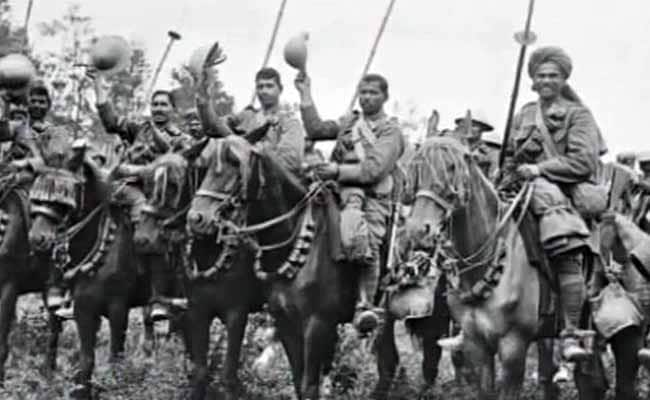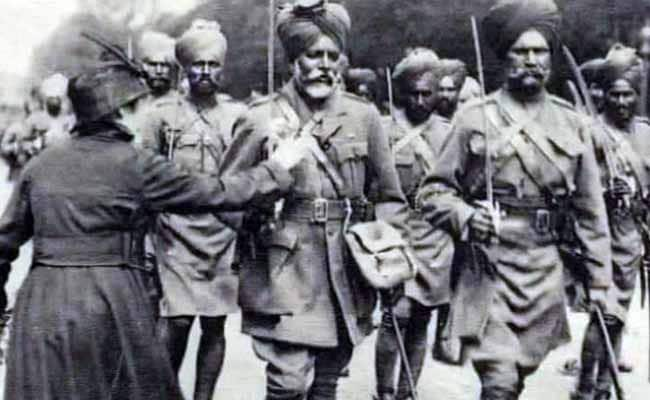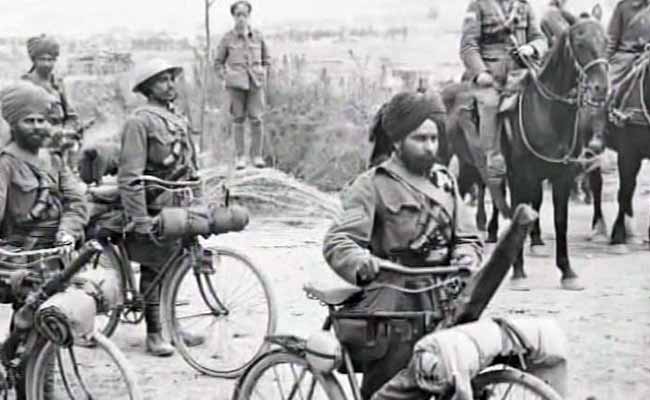Shrabani Basu's book, For King and Another Country, digs deep into British archives and unearths heart-warming, heart-breaking and heroic stories of the Indian soldiers in World War I.
Kolkata:
Which monument in India is a memorial to Indian soldiers who died fighting in World War I?
You could scroll down right now for an answer. But here's why the question has even come up.
Hundred-and-one years ago, when World War I began, one-and-a-half million Indians went to fight in it for the British. About 72,000 died. In the anniversary year, India has done little to mark their martyrdom.
But a new book by India-born London-based author and journalist has. Shrabani Basu's book, For King and Another Country, digs deep into British archives and unearths heart-warming, heart-breaking and heroic stories of the Indian soldiers in World War I.
Eleven of them even won the top British military honour, the Victoria Cross
 "The image of First World War that we got in our history books was of Tommies in helmets. I was not aware that in these same trenches, there were many turbans ...Sikhs, Pathans, Garwalis and Gorkhas were fighting beside the English, dying in the same trenches," says Shrabani Basu.
"The image of First World War that we got in our history books was of Tommies in helmets. I was not aware that in these same trenches, there were many turbans ...Sikhs, Pathans, Garwalis and Gorkhas were fighting beside the English, dying in the same trenches," says Shrabani Basu.
The question that made her write the book: "Why have we forgotten their stories? Why don't we know about 1.5 million Indian soldiers who cross the seas to fight, about 72,000 who died?"
The book contains many a heart-warming tale. For instance, that of pilot Indra Lal Roy or Laddie, just 18 when he joined the British air force. In one of his early dogfights, he was shot down over France, his body found and put in a morgue. Soon after, loud banging on the morgue door and Laddie shouting to be let out.
 In another dog fight, after downing several German planes, Laddie went down. His remains are buried in France. "Laddie was posthumously given the Distinguished Flying Cross. He was the first Indian to win it. He was a flying ace and when he died, he was only 19," says Ms Basu.
In another dog fight, after downing several German planes, Laddie went down. His remains are buried in France. "Laddie was posthumously given the Distinguished Flying Cross. He was the first Indian to win it. He was a flying ace and when he died, he was only 19," says Ms Basu.
Sukkha was an 'untouchable' from India who was a cleaner at a hospital in England. When he fell ill and died, Hindus refused to cremate him, Muslims refused to bury him. "So there was Sukkha, a victim of divisions created by his own countrymen," says the author. "But a British priest said Sukkha fought for England so I am going to bury him. And did."
Most Indians fighting for colonial masters did not know what the war was about. Some felt a loyalty to King George V. But many also felt betrayed, especially Sikhs, as five months after the end of the war, Jalianwala Bagh happened.
 "Hardit Singh Mallik was an Indian pilot. He was a Sikh who flew for Britain in the war. Five months after it ended, he was to get married on Baisakhi. He was marrying his sweetheart and it should have been the happiest day in his life. But Jalianwalah Bagh happened and Hardit Mallick wrote, it is the saddest day of my life," writes Ms Basu.
"Hardit Singh Mallik was an Indian pilot. He was a Sikh who flew for Britain in the war. Five months after it ended, he was to get married on Baisakhi. He was marrying his sweetheart and it should have been the happiest day in his life. But Jalianwalah Bagh happened and Hardit Mallick wrote, it is the saddest day of my life," writes Ms Basu.
These forgotten heroes have been brought back to life in the book which has received critical acclaim in India and the UK. "They served their colonial masters, true," says Shrabani Basu. "But they fought bravely, they gave their lives. The greatest disservice we can do is to forget them. We should be proud of them."
The monument to Indian soldiers of World War I? India Gate in New Delhi.
You could scroll down right now for an answer. But here's why the question has even come up.
Hundred-and-one years ago, when World War I began, one-and-a-half million Indians went to fight in it for the British. About 72,000 died. In the anniversary year, India has done little to mark their martyrdom.
But a new book by India-born London-based author and journalist has. Shrabani Basu's book, For King and Another Country, digs deep into British archives and unearths heart-warming, heart-breaking and heroic stories of the Indian soldiers in World War I.
Eleven of them even won the top British military honour, the Victoria Cross

The question that made her write the book: "Why have we forgotten their stories? Why don't we know about 1.5 million Indian soldiers who cross the seas to fight, about 72,000 who died?"
The book contains many a heart-warming tale. For instance, that of pilot Indra Lal Roy or Laddie, just 18 when he joined the British air force. In one of his early dogfights, he was shot down over France, his body found and put in a morgue. Soon after, loud banging on the morgue door and Laddie shouting to be let out.

Sukkha was an 'untouchable' from India who was a cleaner at a hospital in England. When he fell ill and died, Hindus refused to cremate him, Muslims refused to bury him. "So there was Sukkha, a victim of divisions created by his own countrymen," says the author. "But a British priest said Sukkha fought for England so I am going to bury him. And did."
Most Indians fighting for colonial masters did not know what the war was about. Some felt a loyalty to King George V. But many also felt betrayed, especially Sikhs, as five months after the end of the war, Jalianwala Bagh happened.

These forgotten heroes have been brought back to life in the book which has received critical acclaim in India and the UK. "They served their colonial masters, true," says Shrabani Basu. "But they fought bravely, they gave their lives. The greatest disservice we can do is to forget them. We should be proud of them."
The monument to Indian soldiers of World War I? India Gate in New Delhi.
Track Latest News Live on NDTV.com and get news updates from India and around the world

